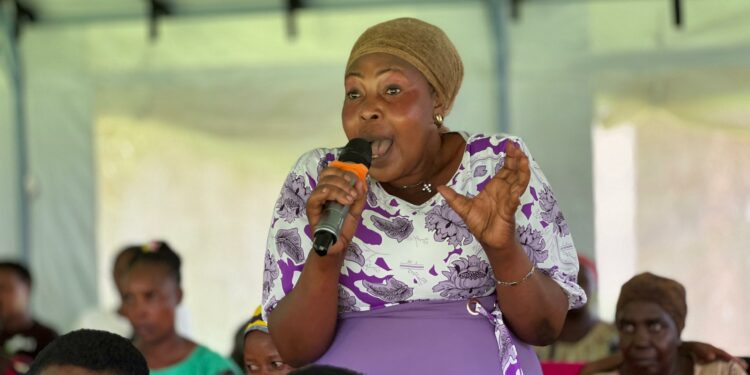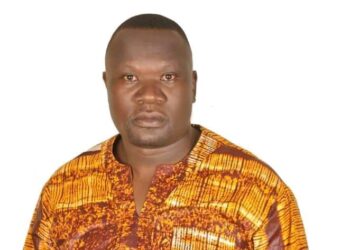By Edrisa Ssentongo
A resounding call for equity, inclusion, and accountability echoed through the Mayor’s Gardens in Mbale on Tuesday 12th June, as women coffee farmers from the Bugisu region convened during the Coffee Baraza.
Hosted by Food Rights Alliance in partnership with ActionAid Uganda, the event was a timely and urgent platform for women to voice their concerns and interface directly with duty bearers, and farmer organizations. to promote compliance, sustainability, and equity in Uganda’s coffee value chain.
The Baraza comes at a critical moment for Uganda’s coffee subsector, which is undergoing major structural reforms, including the rationalization of the Uganda Coffee Development Authority (UCDA) under the Ministry of Agriculture, Animal Industry and Fisheries (MAAIF), and the looming demands of the European Union Deforestation Regulation (EUDR). While these changes aim to enhance traceability, transparency, and sustainability, the voices of smallholder farmers particularly women remain on the margins, navigating these shifts with little information or support.
“Coffee is more than a crop; it’s our lifeline,” said Ms. Gladys Nawire, a member of Namanyonyi Salom Cooperative Society.
“Yet 80% of our members, mostly women, are unaware of what EUDR even is. We are producing coffee in a system that’s leaving us behind. We need targeted training and orientation on these reforms and reassurance that our coffee market is protected.”
Her concerns highlight the disconnect between policy intentions and grassroots realities. Mbale, a hub for Uganda’s specialty Arabica coffee, is located in the Bugisu sub-region where women form the backbone of production—planting, weeding, harvesting yet they are largely excluded from governance in the coffee trade.
“In Bugisu, women do most of the work, but our voices are muted when decisions are made,” Nawire emphasized. “We are the backbone of production, but the system doesn’t see or support us.”
Many women spoke of the lack of technical knowledge and support services. Ms. Agnes Nafuna, another farmer and member of the Elgon Mothers Coffee Group, noted the rising threat of pests like wild rats devastating their crops, a result of inadequate extension services and limited training in pest management.
“Our farms are suffering, and we don’t have the knowledge or extension support to handle pests or understand sustainable farming practices,” she said. “This needs to change if we are to improve the quality and quantity of our coffee.”
Beyond the technical challenges, the women called for financial inclusion as a means of empowerment and economic independence. Nafuna shared how joining a cooperative transformed her experience as a coffee farmer:
“Through our cooperative, we received second payments, which helped us reinvest in our farms and support our families. Cooperatives can be transformative for women—if we’re supported to join and thrive within them.”
However, entrenched gender dynamics continue to stifle progress. Ms. Lydia Nambuya of Bufumbo Organic Cooperative Union captured this injustice vividly:
“We dig, plant, weed, and harvest. But when the coffee is sold, the money is taken by the men. We need training in financial management so we too can make decisions for our farms and our futures.”
These testimonies were not met with silence. Duty bearers at the Baraza listened attentively.
Mr. Otheino Mangeni, Head of Production in Mbale City, acknowledged the barriers but encouraged farmers to seek help:
“We are here to provide technical guidance, support in inputs, and help with value addition. But farmers must also come forward and seek these services. Value addition is everyone’s responsibility.”
Still, the EUDR emerged as the most misunderstood and feared development. Women expressed worry over registration requirements and fears that their lack of land titles or formal documentation could further marginalize them.
Ms. Sarah Sambazi, Chairperson of Bunabudde Coffee Cooperative, passionately voiced what many feared:
“The EUDR should not become another wall separating us from progress. Many of us cultivate coffee on land that once had trees. We need this regulation explained in simple language. Registration officers just come to our gardens without giving us any explanation.”
In response, Dr. George Mangeni Otebero, City Production Officer, clarified that the EUDR process is not meant to exclude anyone:
“The regulation applies to everyone. The purpose is environmental protection and sector improvement. Women will benefit more if they participate in organized structures. Our farm extension workers are mandated to sensitize and support you.”
Ms. Esther Kisembo, a gender advocate, reinforced this by stressing the need for collective action:
“When women unite in registered groups and cooperatives, they can demand services, access opportunities, and navigate compliance processes better.”
Ms. Julian Amanya, a representative of Food Rights Alliance, concluded the engagement with a clear message:
“This Baraza was about giving women a direct platform to interface with duty bearers, to seek clarity, and push for the support they need to navigate the changing coffee sector. Women in the coffee subsector are organized and committed. What they need is recognition, investment, and continuous support.”
As the landscape of Uganda’s coffee sector transforms under both national and global pressures, this Baraza must serve not as a one-time event, but as a catalyst for sustained engagement and structural reform.
Ms. Julian Amanya, representing the Food Rights Alliance, emphasized that the core purpose of the engagement was to provide women with a direct platform to interface with duty bearers an opportunity to seek clarity, raise their concerns, and advocate for the support they need to navigate the evolving coffee sector.
She applauded the efforts of women in Mbale who have taken initiative to organize and lead themselves toward change, noting that their demands are few but powerful anchored in their desire to be agents of their own transformation.,
And these include,
• Simplified and localized training on the European Union Deforestation Regulation (EUDR) and related market requirements;
• Greater representation of women in coffee cooperatives and decision-making spaces;
• Enhanced access to agricultural extension services, especially in areas such as pest control and sustainable farming;
• Financial literacy programs to empower women in managing and maximizing income from coffee;
• Full recognition of women’s land rights and inclusion in land registration processes aligned with the EUDR;
• Targeted government support and investment in women-led cooperatives, alongside inclusive financing models that strengthen women’s participation in the coffee value chain.
Do you have a story in your community or an opinion to share with us: Email us at editorial@watchdoguganda.com














